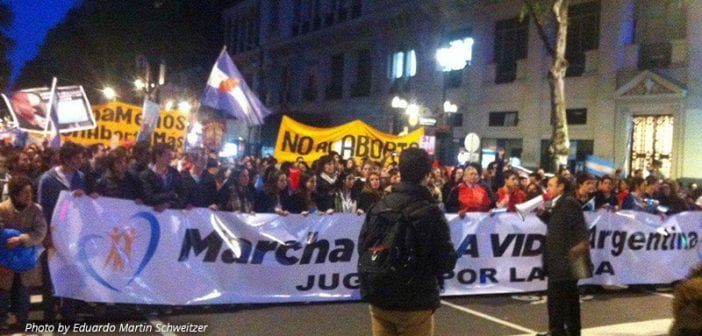Last week, the Argentine Senate rejected a bill to legalize abortion in the strongly Pro-Life country. Under current law, abortion is illegal except in cases in which pregnancy poses an immediate threat to the mother’s health and in limited circumstances in cases of rape. In June, the Argentine House approved an anti-Life bill to legalize elective abortion through 14 weeks. The bill passed only by a narrow margin (129-125) after 22 hours of debate, and Argentine President Mauricio Macri said he would sign the bill into law if the Senate approved the legislation.
Thankfully, the anti-Life bill did not pass the Senate. In the early morning hours of Thursday, the Senate rejected the legalization of elective abortion in a vote of 38-31 with two senators abstaining. The reaction from the Pro-Life side, Salvemos Las Dos Vidas (Save the Two Lives), and the anti-Life activists could not have presented a starker contrast. Footage from ABC News shows Pro-Lifers peacefully celebrating the victory and chanting in unison while anti-Life protesters clashed with police in full riot gear.
"¡Argentina es pro-vida!" Join Argentinians and the worldwide Pro-Life community in celebrating the country's protection of children in the womb!
Posted by Texas Right to Life on Thursday, August 9, 2018
The Pro-Life victory in Argentina is especially significant, because of the strength and influence of the international abortion lobby. As in Ireland, which earlier this year overturned all legal protection for the preborn, well-funded abortion groups put tremendous pressure on elected officials to pass abortion on-demand. Amnesty International, which went so far as defining abortion as a “human right” (ignoring the human rights of the preborn child), and the International Planned Parenthood Federation were active throughout the campaign. Amnesty International went so far as to take out a (very expensive) full-page ad in the New York Times demanding that Argentina legalize the killing of the preborn.
Much to their credit, many Argentine legislators and citizens rejected the false narrative of the abortion lobby. As Professor Charlie Camosy of Fordham notes about the political fight, Pro-Lifers recognized that the “push for abortion rights was serving as a smoke-screen for their country’s genuine problems.” Argentina suffers from a lack of adequate healthcare and the maternal mortality rate is alarmingly high. Abortion activists used this to argue that women were dying from clandestine abortions.
Pro-Life senators and advocates called for legitimate reforms to aid women instead of simply giving women unsafe, legal abortion. The fact remains that abortion is never necessary to save the life of the mother. This is the reason that before legalizing abortion Pro-Life Ireland had one of the lowest maternal mortality rates in the world. Closer to Argentina, Chile successfully reduced the maternal mortality rate after banning many abortions, showing that abortion does not make pregnancy safer for women; legitimate health care does.
Argentine medical professionals were also instrumental in defending Life in Argentina. Hundreds of doctors and health care organizations protested the anti-Life bill. One doctor, Ernesto Beruti, chief of obstetrics at the Austral University Hospital, told CBN leading up to the vote, “How far are we willing to go to? Jail. Even if the law is passed, I’m not going to eliminate the life of a human being. The most important right is the right to live.”
The Pro-Life victory in Argentina is a sign to the international Pro-Life movement that the well-funded abortion lobby does not have the final say. Standing in defense of the most vulnerable, preborn babies and mothers in crisis, requires confronting the lies of the abortion industry and providing women with real solutions.


